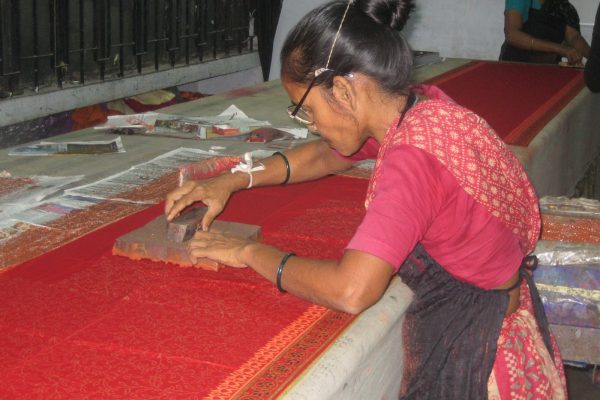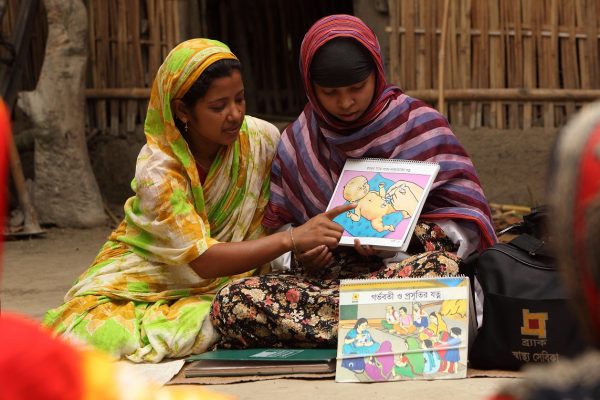health
August 7, 2010

We have the latest update from the flood situation: It has stopped raining in various parts of the province and the water level is receding. However, the Meteorological Department has issued warnings of further rains and chances for flood until 6th August, 2010. Our BRAC Health Team has reported from the field that some people are now returning to their homes, initiating cleaning and fumigation activities.Update on BRAC Response:
July 28, 2010

The BRAC Health Program in Pakistan is still very new – the program in the Northwest Frontier Province began last winter, and it already covers about 3,000 households under the management of 20 female Community Health Volunteers, 4 Health Workers, and one Regional Health Coordinator. This is the second health program to be launched by BRAC in Pakistan, (the first being in Punjab in the fall of 2009).
July 27, 2010

“Wait, let me get my glasses first”. How many times have we heard this expression from our colleagues, parents and friends or pronounced it ourselves? And experienced a feeling of relief as the blur of black waves turns into a legible text! Reading glasses are ubiquitous in our society: we use them when we are working, reading, watching news, etc. – so that we consider them as a basic necessity and take them as granted.Yet, in some parts of the developing world, a pair of reading glasses can be a hard-to-access luxury, available in expensive optic shops in urban areas. This means that millions of men and women lose a great part of their economic productivity, not to mention emotional well-being, as the acuteness of their vision decreases with age. A lot of young people with a weak vision have to forego opportunities to be engaged in certain professions such as jewelry or weaving, or cannot advance in education because of limited reading.
July 26, 2010

Published by BRAC at Jul 26 2010
Categories
On Monday, I had the opportunity to speak at Star Island’s 2010 International Affairs Conference on the rock shoal of Star Island off the coast of New Hampshire. It was a very moving experience as I got the chance to interact with a unique group of people -- generations of families who have been traveling to Star Island for years, enthusiastically learning new things from leading academics and practitioners working in international development in a relaxing and beautiful natural environment.This year, the Conference focused on “Empowering Women and Children for Global Health” with a focus on the growing perspective that the world’s health care challenges can be met by promoting and empowering women and children. Along with Donna Barry of Partners in Health, Ann Cotton of CAMFED and other experts in the field, I was asked to share my experiences about social entrepreneurship, microfinance and the empowerment of women. While the participants had read Kristof and WuDunn’s Half the Sky and Mortenson’s Three Cups of Tea, most of this learned audience had not yet heard of BRAC and its remarkable story and holistic approach to development. They were interested to know about Ian Smillie’s book on BRAC, Freedom From Want, as well as my new book, Social Entrepreneurship, co-authored with David Bornstein (and even carried it in their bookstore on the island!).
July 21, 2010

Having recently returned from Afghanistan, I was encouraged to read a front-page article in last Sunday’s New York Times about Greg Mortenson being the “Unlikely Tutor Giving [US] Military Afghan Advice."We hope that this is the beginning of more press coverage over the work being done by Civil Society Organizations (CSOs) in Afghanistan.BRAC is one such organization, and we have been working in Afghanistan since 2002. Many Afghan refugees began returning to their war-torn country that year. To BRAC’s founders, such post-conflict humanitarian crisis was similar to what they lived through in Bangladesh after the Bangladesh War. It was in such post-war environment that BRAC was first founded in 1972, not unlike how BRAC Afghanistan was started thirty years later.
July 12, 2010

Through a combination of grants from Clinton Bush Haiti Fund, American Jewish World Service, Child Relief International, and Grapes for Humanity/US, BRAC will soon be opening a Limb and Brace Center in Haiti. The UN Office for the Coordination of Humanitarian Affairs estimates that the number injured by the January 12th earthquake in Haiti earthquake is between 200,000 and 250,000 people. The number of people who needed amputations as a result of their injuries is estimated to be between 2,000 and 4,000. BRAC has over a decade of experience running a limb and brace center in Bangladesh and will leverage that knowledge to provide low cost ICRC approved prosthetic and orthotic services to 1,500 Haitians in the first year of operations.
June 10, 2010

I recently spoke on a Council on Foreign Relations panel on maternal health after a special screening of the film ‘No Woman, No Cry’ directed by Christy Turlington Burns and produced by Dallas Brennan Rexer. The film shows the dangers of childbirth when adequate medical care is unavailable. The film extraordinarily captures the real time drama of giving birth. It is a deeply affecting film, which makes the viewer aware of the high risks of procreation, particularly when coupled with poverty.
September 1, 2009

This blog post is part 3 in a 5 part series, Five Ways that BRAC Turns “Oppression into Opportunity” for Women.#1 Confronting Male Violence against Women #2 Empowering Women Economically #3 Fighting Maternal Mortality and Providing Healthcare to the PoorestThe equivalent of five jumbo jets’ worth of women die in child labor each day*. Sierra Leone’s maternal mortality ratio is the highest in the world, with one in eight women dying during pregnancy or childbirth.
April 10, 2009

Published by BRAC at Apr 10 2009
Categories
As a master’s student at Columbia’s school of Public Health, I have become familiar with BRAC’s international work in the public health arena and beyond. Their name has echoed through the halls of Mailman as an exemplary organization committed to sustainable development in some of the world’s poorest locations.While I am currently involved in coordinating a number of research studies, I began to crave direct involvement with international development.
April 7, 2009

Sierra Leone is a beautiful country in West Africa. Its vibrant capital city, Freetown, now has half of its population living in the city and surrounding area making traffic a subject of conversation and much frustration for people.
April 7, 2009

Led by Country Representative Shah Alam (front right) and Tapon Kumar Das (front left), BRAC Sierra Leone has now set up 10 microfinance branches and launched its health, agriculture and livestock programs. I visited the branches in Waterloo and Lunsar on a recent trip. The challenges are enormous in this post-conflict country of roughly 6 million people but the BRAC team is highly motivated to make a difference. A handful of Bangladeshi staff are now working with over 60 staff recruited from Sierra Leone.

